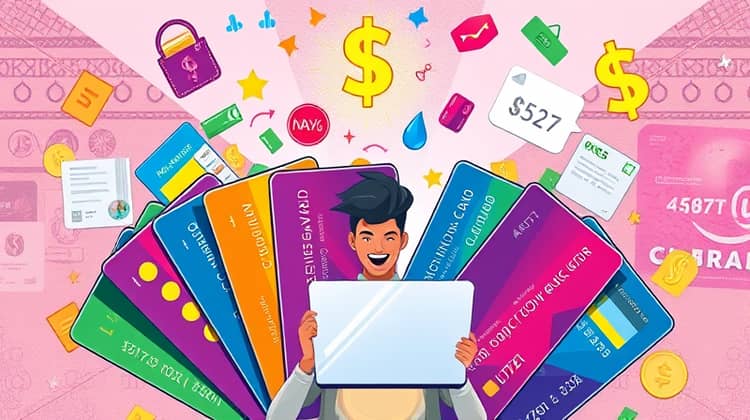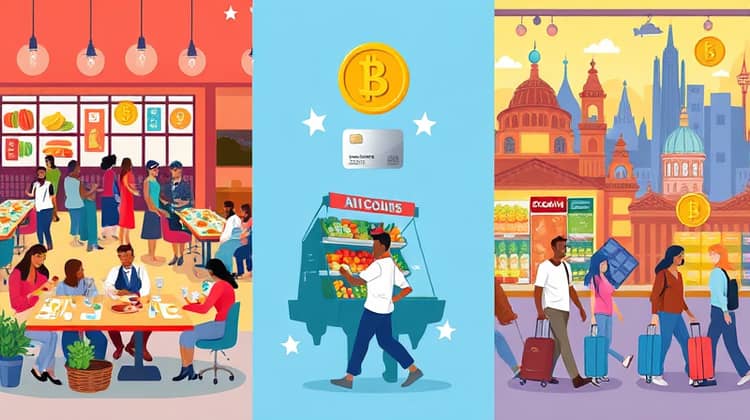Credit card reward programs have become an integral part of managing personal finances for many consumers. These programs reward users for their spending habits, allowing them to earn benefits that can be redeemed in various ways. However, understanding the nuances of these programs is essential to make the most of them.
In this article, we will explore seven critical aspects of credit card reward programs. Whether you're a seasoned user or new to the world of credit cards, these insights will help you navigate and maximize your rewards efficiently.
By the end of this guide, you’ll have a clear understanding of the different types of credit card rewards, how they work, and tips on how to get the most out of your credit card rewards.
1. Types of Rewards

Credit card reward programs come in various shapes and sizes, catering to different consumer needs and spending habits. Understanding the types of rewards available is crucial for selecting the right credit card for your lifestyle.
The primary types of rewards include travel points, cash back, gift cards, and merchandise. Each type has its advantages and may appeal differently depending on your personal preferences and financial goals.
For instance, frequent travelers might benefit more from travel points compared to someone who prefers cash back. Thus, assessing your rewards preferences upfront can lead to more satisfying credit card experiences.
- Travel Points
- Cash Back
- Gift Cards
- Merchandise
2. How Points and Miles Work

Points and miles are commonly used in credit card reward programs, especially those aimed at travelers. Generally, you earn points or miles based on your spending, with most cards giving you a specific number of points for every dollar spent.
For instance, if you spend $100 on a card that offers 2 points per dollar, you would earn 200 points. Accumulating these points or miles can eventually lead to free flights, hotel stays, and other travel-related perks.
- Spoiled for Choice: Diverse Categories to Earn Points or Miles
- Dynamic Valuation: Points and Miles Values Can Fluctuate
- Loyalty Programs: Often Linked to Specific Airlines or Hotels
3. Cash Back Rewards

Cash back rewards have gained immense popularity among consumers for their straightforward benefits. Unlike points or miles that can be more complex to understand, cash back programs provide a clear return on purchases.
Typically, cash back credit cards offer a percentage of your spending back in the form of cash. This can be a simple 1% or a higher percentage for specific categories like groceries or gas, making it easy to accumulate cash.
Also, while cash-back rewards are an attractive option for many, it's vital to consider the card's annual fee and interest rates to ensure the program is financially beneficial.
4. Transferable Points

Transferable points represent another flexible option in credit card reward programs. These points can often be transferred to various travel partners, including airlines and hotels, providing numerous redemption opportunities.
Some credit cards offer a loyalty program where you can earn points and then transfer them to other frequent flyer or hotel loyalty programs. This can potentially increase the value of your rewards, especially during high-demand travel periods.
However, it's essential to understand the transfer ratios and potential limitations of each loyalty program to maximize the benefits of transferable points.
5. Sign-Up Bonuses

Sign-up bonuses are one of the most enticing aspects of many credit card reward programs. Typically, you can earn a significant amount of points, miles, or cash back after meeting a specific spending threshold within a certain period after opening the account.
These bonuses can vary greatly between cards, so it is crucial to compare offers to determine which fits your spending habits. Some cards may offer bonuses worth hundreds of dollars, significantly enhancing their overall value.
However, it’s essential to read the fine print and be cautious of spending thresholds that could lead to incurring debt or finance charges if not managed responsibly.
6. Category Bonuses

Category bonuses provide an exciting opportunity to earn extra rewards on specific spending categories. Many credit cards have promotional offers that allow cardholders to earn higher rewards rates for particular types of purchases, such as dining, grocery shopping, or travel.
For example, a credit card might offer 3% back on travel-related expenses and 2% back on dining, while the standard rate for all other purchases is 1%. This incentivizes users to utilize their cards for their regular spending patterns that fall within these categories.
Nonetheless, it’s crucial to keep track of which categories apply and watch for rotating bonus categories to ensure you're maximizing your spending rewards.
- Identify Categories: Determine Your Spending Habits
- Watch for Promotions: Seasonal or Rotating Categories
- Claim Bonus Rewards: Utilize Each Category Effectively
7. Redemption Options

Once you've accumulated rewards, understanding how to redeem them is vital. Different credit cards offer various redemption options, making it essential to know what suits your needs best.
You might have the choice to redeem rewards for travel, statement credits, gift cards, or even merchandise. Each option may have different value rankings, so being strategic about redemption can optimize your rewards.
- Travel: Book Flights, Hotels, or Rentals
- Statement Credits: Offset Purchases
- Gift Cards: Shop at Various Retailers
- Merchandise: Redeem for Products
In summary, choosing the right redemption method based on your goals can dramatically affect the total value of your rewards.
FAQs

As credit card rewards can be complicated, prospective users often have a lot of questions. This section addresses common queries related to credit card reward programs.
Understanding the details surrounding rewards can help users make informed decisions as they navigate their benefits effectively.
1. Do credit card rewards expire?
Yes, many credit card rewards can expire, depending on the card issuer's terms and conditions. Some cards impose an expiration date on rewards points if the account remains inactive for a specific period of time.
However, other programs may not have a clear expiration date as long as the account stays open and active, meaning consistent usage can lead to accumulated rewards without worrying about losing them.
2. Can I combine rewards from multiple cards?
Consolidating rewards from multiple credit cards largely depends on the issuing bank's policies. Some banks allow you to combine rewards from different cards they issue, but this isn't universal.
In many cases, points or rewards earned on different cards cannot be pooled together unless they're part of the same rewards program. It's critical to review the terms of each card to understand the best strategy for maximizing your rewards.
3. Are credit card rewards taxable?
Credit card rewards are generally not considered income and, therefore, are not taxable. However, certain situations can arise where rewards might be subject to taxation, such as with some sign-up bonuses.
It’s always a good idea to consult with a tax professional if you have concerns about the tax implications of your rewards, especially for large or unusual amounts.
4. How can I maximize my credit card rewards?
Maximizing credit card rewards involves strategically using your card to earn the most points or cash back possible. This includes using the appropriate cards for specific expenditure categories and taking advantage of promotional offers and sign-up bonuses.
Additionally, regularly reviewing your spending habits and potential new cards that offer better rewards aligned with those habits can ensure you're always earning the most from your credit cards.
Conclusion

Navigating credit card reward programs can be complex, but understanding the fundamentals will empower you to make informed decisions and maximize your rewards. From knowing the types of rewards available to understanding how points work, each aspect plays a crucial role in your overall experience.
As a consumer, it's essential to assess your spending behavior and preferences when choosing a credit card to align your rewards with your lifestyle. Researching multiple credit card options can uncover significant benefits like transferable points, category bonuses, and lucrative sign-up incentives that enhance your rewards.
In conclusion, by leveraging various strategies outlined in this guide, you can transform credit card rewards into substantial benefits, resulting in worthwhile experiences and savings on future spending.














